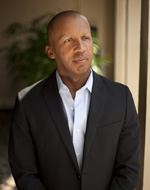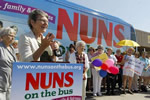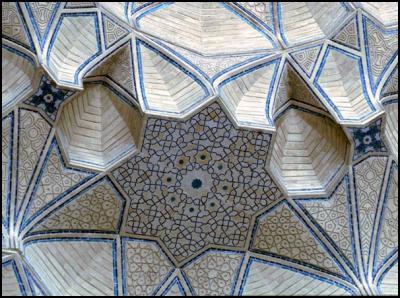
Photo: Rizwan Vaheed
Terrorism may grab the headlines, but across Pakistan, hundreds of unknown activists are working to promote diversity and tolerance.
By Amber Vora | March/April Issue 2012 Ode Magazine
On a hazy winter afternoon last year in Lahore, Pakistan, Diep Saeeda’s adult daughters tearfully begged their mother not to attend a protest she had organized to condemn the assassination of Salman Taseer. They feared for her life. Taseer, the governor of Pakistan’s Punjab province, had been assassinated by his bodyguard because of Taseer’s opposition to the country’s sweeping blasphemy laws. A Muslim, he had spoken out against the laws because he believed they were being used to target religious minorities with imprisonment and death.
Arguably more disturbing than the assassination was the public response. Tens of thousands gathered in cities across the country to celebrate Taseer’s killer. It was harsh evidence that support for extremist violence in Pakistan is not limited to a tiny vocal fringe. While many moderate Pakistanis are aghast at this, they fear voicing opinions publicly. When most Westerners think of Pakistan, they think of the extremism and intolerance that led to Taseer’s assassination. In recent times, conservative religious factions have harnessed Pakistanis’ discontent with inequality and corruption to promote militant interpretations of Islam. Attacks against Pakistan’s minorities have been on the rise. U.S. military campaigns in the region—especially drone strikes that have killed hundreds of civilians in addition to their al Qaeda and Taliban targets—have exacerbated tensions. However, religious extremists aren’t the only ones competing to shape the future of Pakistan.
Across the country, thousands of activists like Saeeda are carrying out courageous acts of compassion and dissent. At great personal risk, they are speaking out against intolerance, whether of religious or ethnic minorities or of those who hold opinions critical of the army, the government or the religious right.
Lahore, a sprawling city of 10 million, is known as the cultural heart of Pakistan, home to poets, artists and lush gardens. Historically, the city has been the cultural nexus for many civilizations, and until recently, remained insulated from violence occurring elsewhere in the country. But when she was organizing the first vigil for Taseer, Saeeda received threatening phone calls she thinks were from religious extremists. “‘If you protest, someone will come and blow you up,’” she says was the message she received. “I said, ‘Okay, you come. I will be there, so you must come.’” Saeeda also reports being repeatedly harassed by Pakistan’s government intelligence agencies, which routinely interrogate, abuse and occasionally kill activists and journalists who threaten the status quo. Brushing aside the threats, Saeeda donned a heavy shawl against the winter chill, gathered freshly painted placards condemning the blasphemy laws, terrorism and religious extremism, and stationed herself at dusk with a candle in hand at one of Lahore’s busiest traffic circles.
One hundred and fifty people had come to an earlier planning meeting for the vigil, but that night only a handful showed up for the demonstration. The rest were too afraid to attend. Surrounded by buzzing schools of auto-rickshaws, scooters and the occasional donkey cart, the vigil went off peacefully and became a weekly ritual. Each week the numbers grew, and eventually, 150 men and women stood with Saeeda, holding their candles at dusk. “We know we can get killed,” she says, “but it is impossible to stay silent and to see all the injustice around you.”
Saeeda’s vigils have lessened now, and since last year she is busy working with Pakistani youth to plan peace delegations to India as well as organizing weekly lectures that explore the roots of religious extremism. Operating on a shoestring budget, she sells her jewelry to pay for office expenses. Despite the challenges, Saeeda embraces a tempered optimism, her eyes sparkling through wire-rimmed glasses, “I’m very positive and hopeful,” she says. “We’re trying to get to those people who think like us but are scared and convince them not to be scared. If we’re going shopping or in the shrines, at any moment they can blow us up, so we should do something for the betterment of our children. But it’s going to take a while.” Waqas Falak, a 23-year-old man from a Muslim family in Multan, shares Saeeda’s passion for change. Multan is known as the City of Sufis for the dozens of Sufi mosques, tombs and shrines with elegant turquoise and white domes that crown its horizon. Sufis make up a significant percentage of Punjab’s population and embrace a more moderate interpretation of Islam. Yet Multan is also close to southern Punjab, which, Falak says, “serves as a nursery for the Taliban.”
“When I was 16 years old,” he says, “I started volunteering for human-rights organizations. I belong to a family of small landlords, and I saw landlords suppressing local farmers. I wanted to work with people so they could know their rights and improve their situation.” Falak also experienced domestic violence within his own family, an ordeal that instilled in him a passion for women’s rights. Several years ago, while volunteering for a women’s organization, he witnessed the non-profit group refuse to assist a transgendered hijra woman. Hijras, who are described as a “third gender,” are born with male bodies but take on traditionally feminine dress and behavior. They have long been part of South Asian culture yet face tremendous prejudice in both Pakistan and neighboring India. The incident inspired Falak to start his own organization with classmates. Neengar Society (Neengar means “youth” in the local Siraiki language) works with marginalized young people and their communities, particularly religious and sexual minorities.
One of Neengar’s first projects began in 2009, when the government of Pakistan infringed upon an ancient Hindu temple complex in Multan, constructing a building without permission from the Hindu community. “When we found out the government was violating the rights of minorities as enshrined in the constitution, we decided to take action,” says Falak, who speaks with poise and passion. “As a Pakistani, this is my heritage also, so I have to support it.”
More than 2,000 years old, the Prahlad temples have significance for Hindus, for whom the religious festival of Holi has mythological origins. The technicolor holiday, which honors the temple’s namesake, is famously celebrated by Hindu and Muslim youth, who lob brilliant liquid pigments in shades of indigo, fuchsia and vermilion at one another. Today, the temple complex has a crumbling edifice of brick and rubble with a desolate feel. It was partially destroyed in a 1992 riot when Pakistani Muslims retaliated against their Hindu neighbors after the destruction of a mosque in India by Hindu extremists. Memories of that attack and recent violence against religious minorities left Multan’s small Hindu population too afraid to protest against the government’s infringement.
After discussions with the Hindu community, Neengar filed a court case to halt construction and preserve the temple. The action was successful, and Neengar Society helped organize the first puja, or Hindu religious ceremony, at the temple since 1992. The event was attended by Hindu and Muslim youth alike. Neengar Society will also launch a puppet theater to educate people about the historic importance of the temple. Because the organization has worked with Christians; abused children; and gay, lesbian and bisexual Pakistanis, Falak and his colleagues decided that Neengar Society’s membership should reflect a cross-section of Pakistani society. As a result, the board is 50 percent female. Two board members are between 15 and 25, at least one is from a religious minority community, and another is from a sexual minority community. At the same time, Falak announces with pride, “In our organization, the coordinator for the Christian [project] and the transgendered people is actually a hafiz of Islam,” someone who has memorized the Qu’ran from beginning to end.
Neengar Society’s membership is a vibrant example of how a tolerant Pakistani society, a society that embraces the faiths and diversity of all its citizens, could be a model society. However, not everyone is prepared to accept the open society that Neengar represents. Pakistan’s security forces have brought Falak up for interrogation, and some of his friends and family have expressed criticism of his work. Yet he is the first to say that support has come from unexpected quarters.
“My younger brother is 17,” Falak says, “and once his friends came to [our office. They] were asking me, ‘Why are you preserving the Hindu temple? Why not a mosque?’ My brother had not been interested [in our work], but that day, he spoke up and said, ‘The Prophet forbid[s] us to destroy the places of worship of others.’ And I was so surprised, that he should say such a liberal thing but rooted in religion. I was really impressed.”
Tahir Khilji, a trim, middle-aged man perched behind his desk in the spartan office of Vision Pakistan, is another of Pakistan’s unknown activists. Based in Abbotobad and Lahore, his non-profit organization has historically worked with marginalized children and sexual minorities. However, as the security situation in Pakistan deteriorated, Khilji has begun to bring together grassroots human rights activists working in marginalized communities to learn from one another and strategize for their security. Khilji is old enough to remember when things were otherwise. “We grew up with very different role models that were secular in nature,” he recalls. “Our history included all people who contributed to the land that is now Pakistan, and we understood that Pakistan was born out of this diverse history, not created by Allah.” Another activist offers similar recollections. “There was much more openness for everyone. My nani [grandmother] would wear trousers and ride a bike to work. In my mother’s era, they would walk to college; now you can’t even do that. There was ballroom dancing. I never saw that, I was too young—but I’ve heard the stories they tell.” Many of Khilji’s activist colleagues have few resources and work in relative isolation. But scattered around Pakistan are dozens of such groups, often low profile and unfunded. “The more I’m getting into communities [and] meeting community-based people, the more hope I have,” Khilji says. “There are small pockets where people are working that we don’t even know about, and there are efforts at collective voice now. These communities must find their own voices because we can’t speak for them as well as they can speak for themselves. We have to invest in these groups, because no one [else] has.”
Asked what he feels hopeful about, Khilji’s answer is somewhat surprising. “Desperation. I’ve never seen this kind of desperation in my country. But I think there has to be grassroots desperation, a very desperate need of wanting to speak. People on the grassroots level are unprotected and want to express themselves. That anger and desperation is going to translate into a movement, a grassroots movement,” he concludes. “Inshallah.”
God willing.
Amber Vora works for Chaya, a group that combats violence and abuse in South Asia. She is writing a book about her time in Lahore, Pakistan.
“It is impossible to stay silent and to see all the injustice around you,” says Diep Saeeda, director of the Institute for peace and secular studies, seen here during a protest meeting against the strict Pakistani anti-blasphemy laws.
Find out more about Diep Saeeda’s Institute for
Peace and Secular Studies. Find out more about
Vision Pakistan.


 Right now, our CDF Freedom Schools partners across the country are serving more than 11,500 children. CDF President Marian Wright Edelman
Right now, our CDF Freedom Schools partners across the country are serving more than 11,500 children. CDF President Marian Wright Edelman  We are so proud of our building neighbors and long-time partners in pursuing justice,
We are so proud of our building neighbors and long-time partners in pursuing justice,


.jpg)





